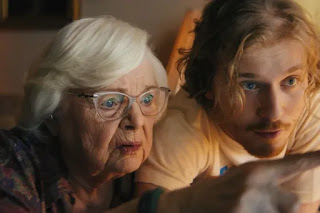At one point in the movie MaXXXine, a porn star (Mia Goth) seeking crossover fame as a horror movie queen, tries to evade a slimy private investigator (Kevin Bacon). To avoid her pursuer, Goth's Maxine seeks refuge inside the famous Psycho house on the Universal Studios lot.
Mark the Psycho house as one of many movie references in the third installment of director Ti West's horror trilogy, which began in 2022 with X and Pearl.
West primes us to see Norman Bates, or a facsimile, pose a frightening new danger, but he purposefully undermines the suspense he creates. Once inside, all we see is the wooden scaffolding that keeps the house from collapsing.
We're behind the facade, a strategy West repeatedly employs as he plays with horror and movie tropes from the 1980s. The result ranges from smartly mounted jests to self-conscious displays of pop-cultural savvy.
MaXXXine feels like an ambitious movie that can't quite shed enough of its genre skin to emerge as something startlingly fresh, even as West works to expose the seaminess behind Hollywood’s bright lights.
The movie's casting probably broadens its reach. Employing a southern accent that makes his words sound as if they've been dipped in grease, Bacon scores as PI John Labat.
The rest of the cast includes Giancarlo Esposito, as Teddy Night, Maxine's unscrupulous agent. Two homicide detectives (Bobby Cannavale and Michelle Monaghan) figure in the plot. Elizabeth Debicki portrays the ambitious director of the crossover horror movie Maxine hopes will make her a star. Of course, it's a sequel.
Then there's Goth, who has staked out impressive territory in three of these movies, most notably in Pearl, the best of the trilogy.
Goth plays the only character who survived the first movie, which saw a group of young filmmakers trying to break into the biz by making a porno. Post X, Maxine traveled to Hollywood where she made a mark in the adult-film world.
Goth's performance embodies one of West's central observations; those who don't wish to become monsters shouldn't aspire to stardom. The movie never forgets that Maxine's past is bathed in the first movie’s bloodshed. Her freckled face looks innocent, until it curdles into an expression of monstrous ambition.
Although it’s difficult to take seriously amid all of West’s showmanship, a story emerges. During the 1980s, a real-life serial killer called The Night Stalker terrified Los Angeles. News footage tells us about this horrific chapter of LA history, which West uses as a springboard to put Maxine in danger. More can't be said without spoilers.
West's movies have become known for adding layers of meaning that elevate them from the usual Hollywood gore ghetto -- while also not abandoning major plasma flows.
The gore in MaXXXine slashes and smashes its way onto the screen like exclamation points.
The movie's conclusion struck me as more risible than chilling; it's followed by a needless epilogue that restates the movie's ideas.
It's also arguable that the parade of movie allusions gets out of hand. West even finds a way to put a bandage on the nose of Bacon's PI. We're clued to remember Jack Nicholson's Jake Gittes, the detective who discovered Los Angeles's dark side in Chinatown.
Chinatown (1974), of course, was not an '80s movie, but West uses the reference to draw thematic connections to his LA foray -- the story that festers beneath the surface, the lowdown.
Garish, glitzy, and gruesome, MaXXXine can’t outdo its predecessors. Still, if you’re a fan of the first two movies, West gives you no particular reason to avoid the trilogy’s semi-successful finale.
Oh, I almost forgot an important question: Is MaXXXine scary and creepy enough to haunt you once you leave the theater? I don't think so.








